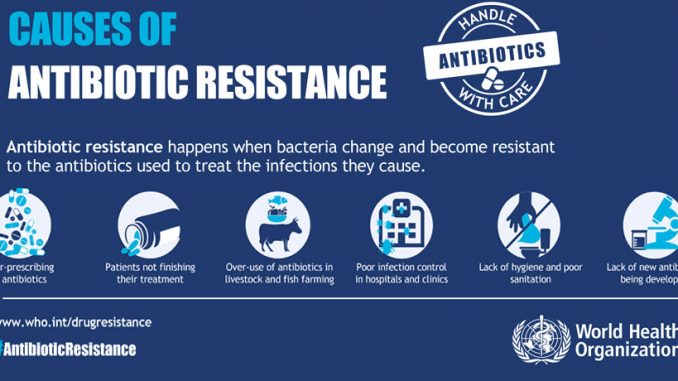
In News
To tackle the growing menace of antibiotic resistance, the World Health Organisation (WHO) has brought out a new tool called AWaRE.
In-Detail
- In a global campaign against rising antimicrobial resistance the WHO had urged the partner governments to adopt the new AWaRE tool.
- The tool was developed to make antibiotic use safer and effective.
- It classifies antibiotics into three groups based on their therapeutic efficiency – Access, Watch, and Reserve.
- It specifies which antibiotic to use for which ailment based on the severity of the condition.
- The tool also mentions which essential medicines to be available all the times in the healthcare system and which must be used as a last resort.
- The tool essentially helps the policy makers and medical professionals to take effective steps in tackling antibiotic resistance.
Promoting ‘Access’
- In the campaign, the WHO aims to increase the global consumption of drugs in the Access group to 60% as these are narrow-spectrum drugs that target a specific microorganism rather than many and reduce the usage of drugs in Watch and Reserve groups which have a risk of resistance.
- Also, drugs in the access group are cheaper and are available in generic forms.
Antibiotic Resistance
- Unregulated usage of antibiotics has given rise to superbugs that are resistant to these drugs and are that much more difficult to kill.
- Antibiotic resistance has thus become the most pressing health concern that can undo the medical progress that humanity had achieved so far.
- It has become a silent pandemic.
- Majority of the resistance has occurred due to the unwarranted usage of antibiotics to kill viruses when these drugs are effective only against bacteria.
- Bacteria that have been exposed to these drugs for generations have developed resistance to them.
- Already deadly resistant gram-negative bacterias like Escherichia Coli, Acinetobacter and Klebsiella pneumoniae are spreading across the world. These are hospital infections that cause pneumonia, blood infections, wound site infections etc.
- When antibiotics are not effective against these hospital treatments gets costly and recovery takes more time.
New Antibiotics
- Research into the development of new antibiotics is taking place world over but fruitful results are still to emerge.
- Till the development of new drugs effective usage of the present drugs is important to restrict resistance and AWaRE tool is effectively doing this.
India Scenario
- Most often it is the low- and middle-income countries that are facing the burden of antimicrobial resistance.
- Over-The-Counter (OTC) availability of antibiotics, rampant usage of antibiotics in the meat producing industry, unnecessary prescription of the drugs, etc, are some of the reasons for high antimicrobial resistance in the country.
- But, India is also one of the pioneering nations that took action against antibiotic resistance.
- In 2014, it had launched ‘Chennai Declaration’ – a five-year plan to control antibiotic resistance in the country.
- It has also launched ‘Red Line Campaign’ to create awareness among the public to the issue of antimicrobial resistance.
Conclusion
Antibiotic resistance is becoming a major healthcare problem across the globe. There is an urgent need to tackle the problem and WHO’s AWaRE tool is a perfect solution. It is both practical and implementable by all nations.

Leave a Reply
You must be logged in to post a comment.